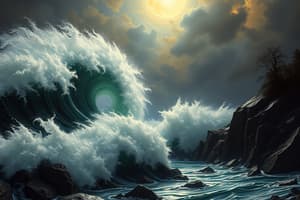Podcast
Questions and Answers
How are tsunamis generated?
How are tsunamis generated?
- Through displacement of the seafloor under water (correct)
- Through displacement of the seafloor above water
- Through creation of the seafloor under water
- Through creation of the seafloor above water
What is a tsunami?
What is a tsunami?
- A series of water waves that travel away from a fault in all directions at high speed (correct)
- A series of water waves that travel toward a fault in all directions at low speed
- A series of water waves that travel toward a fault in all directions at high speed
- A series of water waves that travel away from a fault in all directions at low speed
Why do ships at sea tend not to notice tsunamis?
Why do ships at sea tend not to notice tsunamis?
- Tsunamis in deep water have small wave height and long wavelength. (correct)
- Tsunamis in deep water have small wave height and short wavelength.
- Tsunamis in deep water have large wave height and short wavelength.
- Tsunamis in deep water have large wave height and long wavelength.
Why does the wave height of a tsunami increase as the tsunami enters shallow water?
Why does the wave height of a tsunami increase as the tsunami enters shallow water?
What type of plate boundary are most tsunamis associated with?
What type of plate boundary are most tsunamis associated with?
Which ocean is associated with most tsunamis?
Which ocean is associated with most tsunamis?
Will Sumatra experience another tsunami like the destructive one of December 2004?
Will Sumatra experience another tsunami like the destructive one of December 2004?
Flashcards are hidden until you start studying
Study Notes
Tsunami Generation
- Tsunamis are generated through the displacement of the seafloor underwater.
- This displacement can occur due to seismic activity or volcanic eruptions.
Definition of Tsunami
- A tsunami consists of a series of water waves that travel away from a fault in all directions at high speed.
- These waves can travel across entire ocean basins.
Ships and Tsunami Detection
- Ships at sea typically do not notice tsunamis because, in deep water, tsunamis have small wave height and long wavelength.
- This characteristic allows deep-water tsunamis to pass unnoticed beneath vessels.
Wave Height Increase in Shallow Water
- As a tsunami approaches shallow water, the wave height increases because the energy must be contained within a smaller water column.
- This leads to more destructive waves impacting coastlines.
Plate Boundaries and Tsunamis
- Most tsunamis are associated with convergent plate boundaries, where tectonic plates collide and cause seismic events.
Oceanic Association
- The Pacific Ocean is the ocean most commonly associated with tsunamis due to the presence of subduction zones and tectonic activity.
Future Tsunami Risk for Sumatra
- Sumatra is likely to experience another tsunami similar to the catastrophic event of December 2004, as it is located near several ocean trenches.
Studying That Suits You
Use AI to generate personalized quizzes and flashcards to suit your learning preferences.




